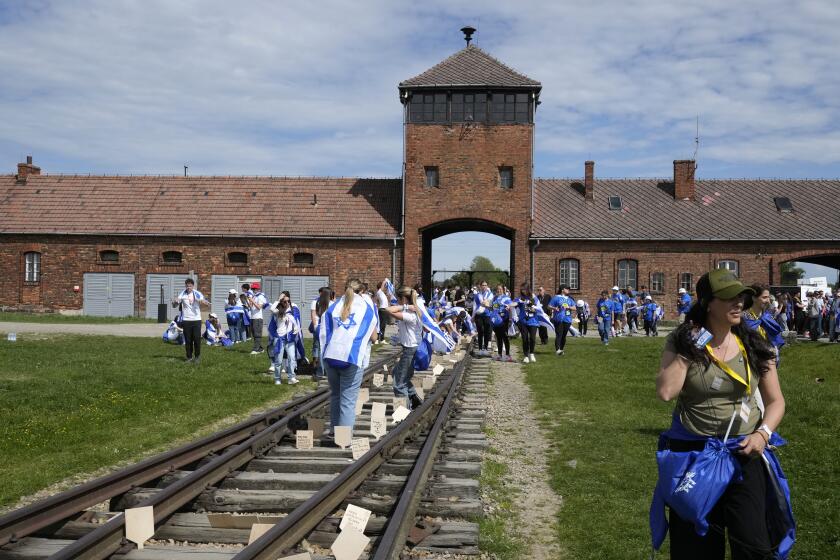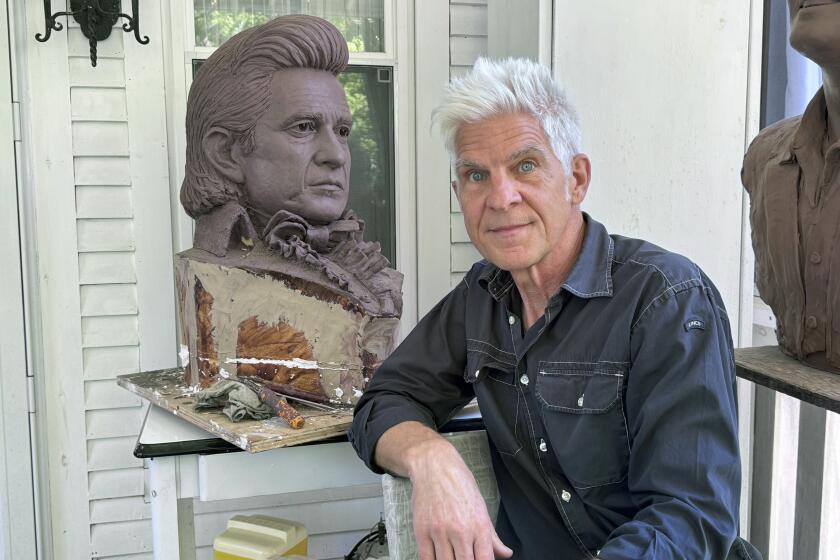A Narrow Escape From Darkness Into the Light
David Leclaire was outside, taking a break from his job training Port Authority police officers. To the east, he could see the New Jersey entrance to the Holland Tunnel, and in the distance, across the Hudson River, the World Trade Center.
The 51-year-old officer looked up in time to see the first plane hit.
His cell phone didn’t work, so he ran into the lobby and used one of the house phones to call his partner, Michael Edwards. A plane . . . the trade center . . . a crash.
“Come on, Dave,” Edwards said.
“Mike, I’m telling you, come downstairs,” Leclaire insisted.
Within minutes the partners grabbed their bulletproof vests and flashlights and set out for the disaster.
But first, there was something Leclaire had to do. His 21-year-old daughter, Brianne, was a student at Pace University in lower Manhattan, and he wanted desperately to reach her. He called home. No answer. He called her cell phone. Nothing. Had she already gotten on the bus? He tried again, and this time, Brianne picked up. She had overslept.
“Don’t get on that bus, don’t come into the city,” he told her. “There’s a terrorist attack going on, and I’m going there.”
She was frightened. “Do you have to go there?” she pleaded. “Don’t go there. Come home.”
“I can’t,” he said. “I gotta go there. It’s my job.”
She was crying when he hung up the phone.
On the way, the officers talked about what they expected to find. Leclaire and Edwards--partners for two years, friends for seven, since they patrolled the bus terminal near Times Square--swore that they would not be separated.
“Hurry up, come in, stuff’s still falling!” someone yelled, as Leclaire and Edwards reached the trade center’s north tower. They ducked inside. Behind them, they heard thud after thud. These were, they soon realized, the sounds of plummeting human bodies.
Despite their pledge, Leclaire and Edwards soon were separated in the chaos. Leclaire went to the underground concourse.
“Get out, get out, quick!” he cried.
“People were actually stopping to use the phones,” Leclaire recalled. “We had to go over there, drag them away from the phone, throw them out of the building.”
And then he heard the sound, an almost indescribable roar that grew louder, louder, louder, until it seemed like the loudest sound in all the world.
Everything went black--the kind of black where it doesn’t matter if your eyes are open or closed because you see the same thing.
A wind blasted through the concourse. In the darkness, Leclaire felt his back, his legs, his arms being pelted by debris. He knew that his body was protected by his bulletproof vest, so he turned his head away from the wind.
And then: BOOM!
He was picked up, propelled across the concourse and slammed against a wall.
He did not know it, but from his subterranean vantage point Leclaire had just witnessed--or experienced--the collapse of Two World Trade Center. The debris in the air was bits and pieces among the millions of pounds of steel and concrete and glass, hurtled through the underground passageways of the concourse by the force of the collapse.
Lying on the floor, Leclaire reached for his flashlight. He turned it on, but all he saw was a glowing halo--the air was dense with dust and ash, blocking the beam almost completely.
The noise was gone. No moans, nothing.
“If there’s anybody there,” Leclaire shouted, “if you can hear me, come to my voice. I’ve got a flashlight.”
Out of the darkness, a New York City police detective appeared. And then, a captain. And then others. He would never know how many--he could not see them. Leclaire grabbed the detective’s coat, the detective grabbed the captain, and on and on.
Suspended in darkness, he did not know if the floor was safe, if the walls were there or if the ceiling was hanging above him by a thread. So slowly, gingerly, he moved away from the direction of the explosion. He reached out and felt a wall, and started to follow it, his human chain following.
What did he think about, in the darkness?
He thought about his daughter and her tears. He thought about his 23 years on the force, and how he could have retired three years before. He thought about his partner. Had he survived?
He took a step, and felt himself tumble downward. But he did not fall--the detective behind him held on. Then he realized: This was not a hole. These were steps that would take him down into a subway station.
They made their way to an exit, and climbed the steps, to daylight.
On the street, Leclaire found a city police officer, unable to move because there was something wrong with his knee. He carried the man down Broadway, to a medical station.
Leclaire tried to rinse the gray ash out his eyes. He spit black gunk from his lungs. He couldn’t hear well, either; his ears were packed with the dust. Nonetheless, he heard the cry: “Run north! Run north!”
He looked back toward the trade center. He saw the antenna on the surviving tower begin to move, and the top of the building come down.
Leclaire took off.
He reached Park Row, south of City Hall, when the earth buckled. He turned around to see a cloud of debris fast advancing. He dove for the street and covered his head. The cloud turned day into night for 10 minutes, and when the sun cut through, Leclaire was still alive.
His first impulse was to walk toward the World Trade Center, to look for Edwards. But an officer turned him away, so he went looking for the Port Authority police command center. He found it at the Borough of Manhattan Community College.
A bunch of cops brought him into the gym. There, a room full of police officers stood and cheered; Leclaire looked around to see who had come through the door. Then, he understood: This was for him. He had been listed as missing.
On the way in, he found Edwards.
Edwards had ducked into a building when the first tower went down. “I got out a second before it was gone, and he’s in there. I thought he was gone--my goofy partner,” Edwards said.
More to Read
Start your day right
Sign up for Essential California for news, features and recommendations from the L.A. Times and beyond in your inbox six days a week.
You may occasionally receive promotional content from the Los Angeles Times.






